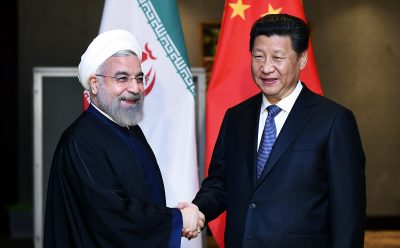On 28 June 2020, former Iranian president Mahmoud Ahmadinejad accused the Iranian government of concluding a 25-year agreement with another country with the purpose of stripping Iran of its resources and deploying foreign forces on its land. Tehran denied Ahmadinejad’s claim, saying the idea behind the agreement was owed to the visit of Chinese President Xi Jinping to Tehran in 2016. Beijing did not comment, sufficing to say the two countries are developing their bilateral relations.
The Agreement
One of the terms of the leaked agreement between China and Iran on developing weapons and exchanging intelligence information to combat terrorism, drug smuggling and human trafficking aims to establish an air and maritime military alliance that may include Russia in a later stage. Observers opined the agreement aims at striking US presence in the Middle East, getting around the imposed sanctions on Iran, and rescuing Iran’s oil industry, since Beijing imports what comes to less than a quarter million oil barrels per day from Iran.
Through this agreement, Iran seeks to improve its economic status. It also hopes Trump loses the coming presidential elections, the return of the nuclear agreement, and re-pumping Iranian oil into global markets as the pandemic recedes and tourism is revived. Iran believes these goals are possible in light of the current US-Chinese escalations and China’s endeavors to be present in the Gulf to exploit the US vacuum or the blackmailing strategy that Trump practiced since he came to office.
The agreement expresses a pattern of extended relations between Beijing and Tehran since the 1970s, when China stopped supporting local communist parties and began contacting Iran as a rising regional power after the Islamic Revolution in 1979, particularly since Tehran was looking for a source of weapons outside the Western sphere, whether from China, Russia or North Korea, to counter the Western arms embargo in 1979 and 1980.
Strategic Partnership
Iran possesses a geopolitical importance for China due to the fact it is a coastal country on the Caspian Sea, and its southern border is located at the narrowest point in the Gulf connecting the Arabian Sea and the Indian Ocean. Iran is also Beijing’s leading oil suppliers. In addition, it is a potential hub for energy transport between the Middle East, Central Asia and Europe, and it is located on the China-Europe railway line circumventing Russia.
China’s growing energy needs during the 1990s formed the basis for the expanded relationship with Iran. The bilateral partnership developed due to US pressure on Europe, Japan and Russia to reduce their trade and investment ties with Iran. When China launched the “Belt and Road” initiative in 2013, Iran showed its willingness to join the initiative, in light of its endeavors to “look East”, a policy in which China became the main beneficiary. China appeared as the most important economic partner for Iran that pushes capital into its extractive industries, especially in the sector of oil refining. The Tehran-Qom-Isfahan High Speed Rail Project is among the few infrastructure projects run by foreign companies. The project is managed by the China Railway Group Ltd. and financed by Chinese loans.
At the beginning of the coronavirus outbreak, Iran did not halt its flights to the Chinese city of Wuhan. Despite the suspension of all flights on 31 January 2020, the Iranian airline Mahan Aviation, affiliated to the Islamic Revolutionary Guard Corps, continued its flights between Tehran and four major Chinese cities. This led to claims that this was the main reason why the virus spread in Iran. The Iranian deputy minister of health affirmed the link between the Chinese and the spread of the epidemic. However, China eased the tension by sending humanitarian aid to Tehran.
Beijing and the Nuclear Agreement
China’s integration into nuclear diplomacy with Iran goes back to the 5+1 negotiations. Beijing adhered to the principle of non-interference in Iranian sovereignty in accordance with the “Five Principles of Peaceful Coexistence” in its foreign policy. Iran, on its part, was keen on China’s stance against the US, especially since China is participating in the reconstruction of the Iranian nuclear plant in Arak, playing a technical role in the nuclear agreement, which means China should remain committed to make the agreement appear successful to close the Iranian nuclear file. In addition, China became a member in the Joint Committee, which is a mechanism for resolving disputes.
Beijing was the main partner for Iran in the field of nuclear technology until 1997. It helped establish the main elements for its current program. It has also been one of the largest arms suppliers to Iran for nearly 40 years. In addition, it was able to advance over Russia in military sales between 2008 and 2012, when Russian-US relations improved slightly during the Obama era.
China expressed its resentment regarding the sanctions imposed on Tehran, especially that they affect their trade relationship. It reached common rapprochements with Russia to propose amendments to the sanction resolutions. China also criticised the Western bias towards non-proliferation efforts, describing it as hypocrisy and a lack of credibility.
After US President Donald Trump announced his plan to withdraw from the Joint Comprehensive Plan of Action (JCPOA), or what is known as the Iranian nuclear agreement concluded in 2015, China announced its rejection of the US “maximum pressure” policy on Iran. China asserted the necessity to commit to the agreement and dissolve contentions between all parties through dialogue. This is due to the fact that this agreement contributes to preserving non-proliferation and serves peace and stability endeavors in the Middle East. Beijing showed its readiness to coordinate between the parties.
Beijing has called for the gradual lift of unilateral and multilateral sanctions against Iran. It received an exception from the US sanctions on Tehran to buy Iranian oil until 3 May 2019. This saved Iran from the deterioration of its economic conditions, which led to demonstrations by the end of 2017. However, China has contributed to international sanctions against Iran, such as the United Nations banning the export of major conventional weapons to Iran in 2010; and in 2015, the Security Council unanimously passed Resolution 2231, which upheld the five-year arms embargo and the eight-year sanctions on the ballistic missile program.
China affirmed that its commercial ties with Iran are legitimate and open, and do not violate Security Council resolutions. It also affirmed its opposition to unilateral sanctions. This was in response to US statements that companies that will deal with Iran will be banned from doing business with the US. In February 2020, the US imposed sanctions on three Chinese companies and one individual for allegedly aiding the Iranian missile program. On the other hand, Iran, Russia, and China worked on strengthening their ties by holding naval exercises in December 2019 in the Arabian Sea and the Indian Ocean near the Strait of Hormuz, to dissuade the US from attacking Iran.
Future Relations
The Chinese-Iranian relationship adopts a pragmatic approach. If China had the desire to improve its relationship with the West in the future, its relationship with Iran may be negatively affected, in spite of the strategic interests that bind them. In addition, China’s relations with countries such as India, Israel and Saudi Arabia are faced with Iranian caution. Tehran sees its relationship with China as a part of a network of unilateral relations that extend to include Asian powers such as Japan, and a means to face international isolation and rescue its economy from US sanctions. However, China appears cautious. Its trade with Iran constitutes a small part of its commercial relations with other countries, and Beijing can compensate for the shortage of Iranian oil supplies through Russia and Saudi Arabia.
China finds trade with the Gulf more attractive than with Iran, as Saudi Arabia is the largest oil supplier to China. Chinese companies have also committed investments and construction contracts worth $123 billion to the Gulf since 2013. Despite the fact that China does not represent a military threat to Iran, Iranian support for Islamists in the Chinese province of Xinjiang is a source of concern for Chinese leaders, who consider them a source of terrorist threats, and this is used as a pretext to take repressive measures in that region. The development of Iran’s nuclear capabilities contradicts the official Chinese position on non-proliferation and the dominant interests in regional stability. Iran’s regional ambitions seem to go beyond promoting integration on the Silk Road project, and they may not necessarily coincide with China’s long-term goals.













